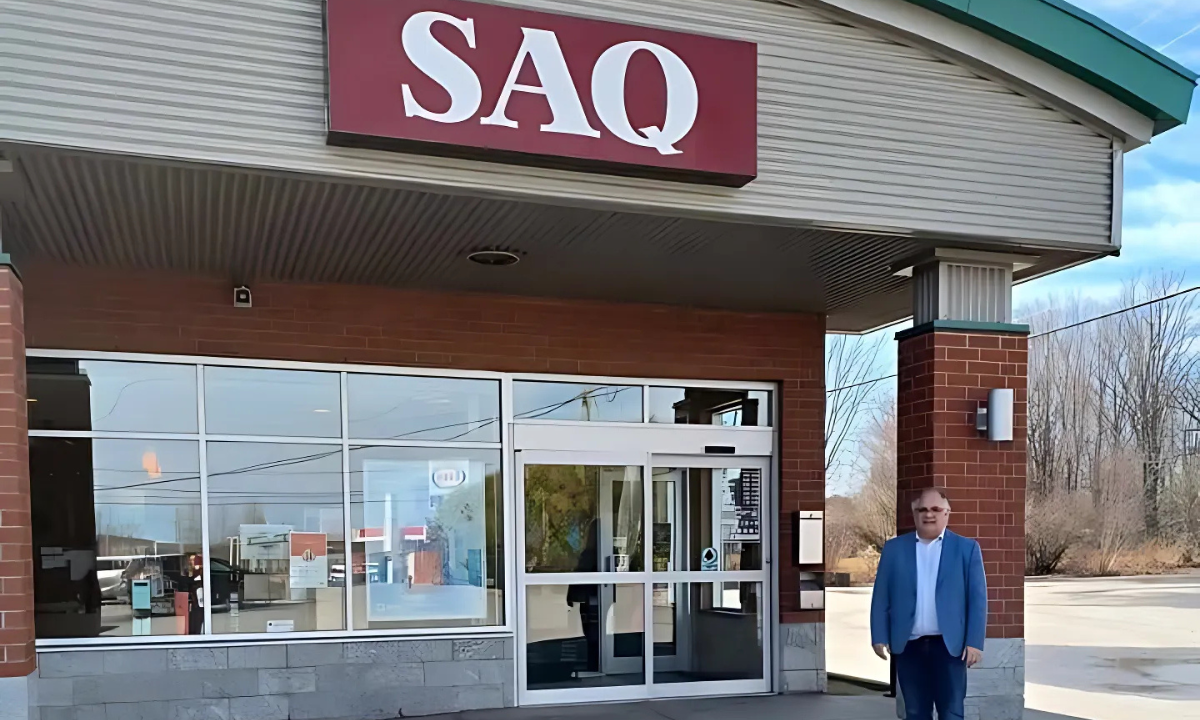Is a liquor store a community development instrument?
Why It Matters
Last year, the Quebec government closed province-run liquor stores in downtown areas and moved them to the ‘burbs, and the mayors of those towns say this undermines efforts to revitalize downtowns.

Quebec mayors say they want the government to stop closing their downtown liquor stores.
Several mayors called a press conference last week condemning the closing of the state-run stores (SAQ) and moving them to the suburbs.
“When SAQ closes a store to relocate, it relies on large commercial spaces lined with parking lots near highways,” said Gatineau Mayor Maude Marquis-Bissonnette.
“It perpetuates urban sprawl and car dependency, and it affects commercial street vitality,” she added, arguing these public decisions have environmental and financial community impacts.
Liquor stores as community development?
This protest has been brewing for a while. Over the years, public interest organizations such as Vivre en Ville and the Centre d’écologie urbaine have noted the conflict between two government policies.
The Quebec Ministry of Municipal Affairs and Housing advocates urban densification. However, the government agency SAQ manages store locations purely based on where they will make the most money.
Meanwhile, alcohol consumption is declining in Canada and other OECD countries. The SAQ notes, among other things, an increase in sales of non-alcoholic beverages and young people making spontaneous purchases rather than stocking up like older generations. Therefore, the SAQ is opening counters in convenience stores with longer opening hours.
However, despite the drop in sales volume, SAQ reported a gross profit increase of 2.5 per cent last quarter due to rising prices.
“What is the acceptable level of profitability for a government corporation like the SAQ?” said Stanstead Mayor Jody Stone, a municipality of 2,800 people near the U.S. border.
The government has a responsibility that goes beyond profits, said
Heidi Ektvedt, mayor of Baie d’Urfé, a municipality of 3,700.
That responsibility was noted in 2021 in an op-ed signed by three mayors and Vivre en Ville.
“It’s understandable that private businesses should be located according to their business potential without considering the consequences of their choices for the community. But you don’t run a business like any other: the SAQ is a public corporation. As players involved in defending the public interest, we feel justified in calling you to account.”
Time to be exemplary: Mayors
Public interest organizations and mayors asked the government to “be exemplary” and align SAQ decisions with the Land Use Planning and Development Act, which promotes “thoughtful and sustainable development of the territory.”
Marquis-Bissonnette said the City of Gatineau spent $16M over the last three years to help revamp its post-pandemic downtown.
“Our downtown is starting to come back to life. We’ve added housing, small businesses have set up shop, and we’ve improved our cultural and entertainment offerings. The SAQ’s departure sends the wrong message to the population and investors, “ said Marquis-Bissonnette.
“We find ourselves in an absurd situation where the closest option is Ottawa. Naturally, Gatineau residents will do the rest of their shopping there, too,” she added.
Liquor stores are generally considered flagship stores, attracting sales to surrounding businesses.
Several restaurants in Montreal’s southwest district recently adopted the “bring your own wine” formula, explained Benoit Dorais, mayor of the Montreal borough, as a way of keeping the final bill reasonable given recent inflation.
Dorais said the closing of Monk Street SAQ, located on the district’s main commercial street, will affect these restaurants.
“The government is asking small and medium-sized enterprises (SMEs) to be agile and adapt; it should be consistent and salute their efforts instead of harming them,” he added.
Like Gatineau, Montreal Southwest has spent money to help revitalize its downtown since the pandemic.
The City spent $1.5 million on urban development and allocated $846,000 to the commercial development society to diversify its offering.
“In 2021, we had 20 per cent vacant space; today, the rate is 5 per cent,” said Dorais.
Since this bruhaha began, only one community has kept their liquor location: Victoriaville.
In 2023, the SAQ announced it would move Victoriaville’s downtown store to a suburban power centre. However, Mayor Antoine Tardif’s advocacy prompted SAQ to temporarily reverse this decision. SAQ will remain on Victoriaville’s Main Street until 2028, but after that, nothing is certain.
The deadline to sign the SAQ closures moratory is May 26.
“It is simple: if a toy store closes on the main street, we can attract another. But if a SAQ store closes, we cannot replace it. There is a hole in the commercial community offer,” said Tardif.

